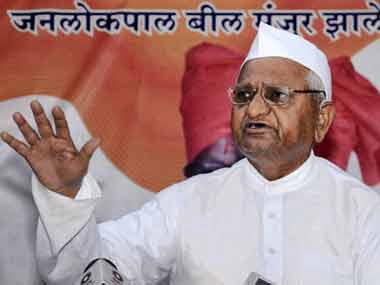The government’s decision to introduce a ’not more than 50 per cent’ reservation for women, SC/ST, OBC, and minorities in the Lokpal, has lawmakers and judiciary sharply divided. While Anna Hazare readies himself for his 27 December fast, and with the debate on Lokpal slated to happen next week, the focus has shifted from Lokpal to reservations in the Ombudsman: Should social diversity weigh in an empowered body to fight corruption? Speaking at the parliament yesterday afternoon, the BJP had termed the decision ‘patently unconstitutional’. “The BJP will move an amendment motion against the provision for reservation to minorities in the Lokpal Bill. This is against the Constitution which does not provide for reservations on the basis of religion,” Sushma Swaraj said in the parliament. [caption id=“attachment_164264” align=“alignleft” width=“380” caption=“PTI”]  [/caption] The government was forced to bring in reservation within the Lokpal after Opposition parties led by Lalu Prasad Yadav demanded that it also represent minorities. The reservation clause was brought in at the last minute as a corrigenda. Lalu Prasad Yadav of the RJD said all parties had agreed to the reservation clause at the all-party meet called by the government before the bill was tabled. “Under pressure from the BJP and the RSS the word minority was removed from the Bill last night. There was provision for reservation for SC/ST women and minorities. This had been accepted at the all party meeting. There is conspiracy behind removing minority quota. If there is no reservations for minorities there will be protests,” Lalu said in the Parliament on Thursday. Reacting strongly against the government’s decision to bring in reservation for minorities, Yashwant Sinha of the BJP said, “You are seeking to amend this Bill through this corrigenda. This is blackmail; this is not a parliamentary practice, and I oppose it strongly. The government has no business doing this through this corrigenda. Corrigenda (are) used for correcting spelling mistakes and not to move amendments to a Bill… This government has shown a monumental inefficiency in dealing with this Bill.” Speaking to the media, MoS PMO Narayanaswamy said that while some courts have ruled against religion based reservations, courts at times have upheld religious reservations. “There is no law which says whether religious reservations are valid or not,” he said. While the parliament was clearly divided over the issue of reservations members of the Judiciary, political analysts, and civil society too are unclear about what to make of the situation. “The constitution contemplates reservation for certain reserved classes and not for minorities and others but if the government wants to make reservations it is possible,” Team Anna member Justice Santosh Hegde said. “In a small nine member body like this to have reservation for women, SC/ST, minorities and backward classes is not practical”, he added. Former Supreme Court Justice JS Verma was quoted by the Indian Express, “I have always believed that those at the top should reflect the plurality of Indian society. That is central to any conception of inclusive democracy that we aspire for. Even without decreeing that there should be places reserved, I have always been a votary of ensuring that there is a broad-spectrum representation of people on benches, for example. Once that is done, it takes away any excuse for turning down any findings of the Lokpal as being the view of a certain empowered caste or class.” While everyone agreed in principle with the government’s rationale to bring in reservations - to reflect the plurality of country - most disagreed with the idea that reservation is the only means to achieve social justice, and representation. “Why is it important to ensure whether the person is a Brahmin, Muslim or another caste? The job of the Lokpal is to fight corruption and those who can do it should be appointed to the post. This won’t help the country in the long run. If this is challenged in courts, several other issues, “untested waters so far,” may be raised “like why the judiciary or the armed forces should be insulated from the principle of reservation,” Justice BN Srikrishna said. Team Anna meanwhile has steered clear of the debate and has maintained that they would go by the parliament’s decision on the issue of reservations in the Lokpal.
Government’s decision to introduce a ’not more than 50 per cent’ reservation for women, SC/ST, OBC, and minorities has the lawmakers and the judiciary sharply divided.
Advertisement
End of Article


)
)
)
)
)
)
)
)
)



